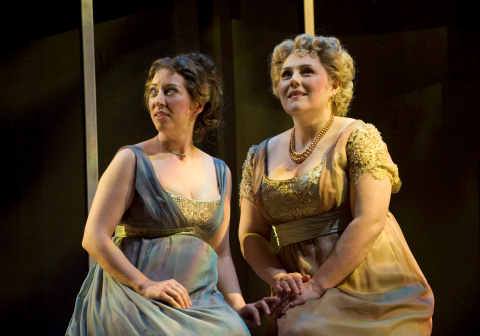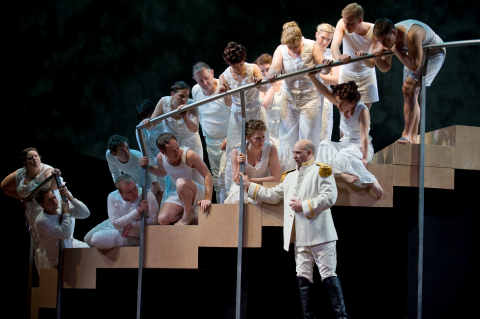Other Links
Editorial Board
-
Editor - Bill Kenny
-
Deputy Editor - Bob Briggs
Founder - Len Mullenger
Google Site Search
SEEN
AND HEARD INTERNATIONAL OPERA REVIEW
Handel, Semele at
Pacific Opera Victoria : Soloists, cond.
Timothy Vernon, dir. Wim Trompert, set and costumes
by Brian Perchaluk, lighting designer Ereca Hassell,
chorus dir. Michael Drislane, Royal Theatre,
Victoria, British Columbia, 14.2.2009 (BJ)
The trouble was, first of all, that the shift of
environment was quite inconsistently applied. How,
indeed, could it not have been, considering the
implosion of a group of variously bedecked Olympian
gods into the morning-coated setting of a Victorian
wedding party? Then there was the treatment of the
chorus, whose members were forced mostly onto their
knees, or lower still into absurdly writhing
postures, and who, like most of the cast, had to sing
from these vocally unhelpful positions.

Nathalie Paulin (Semele)
and Anita Krause (Ino)
Up to this point, aside from some less than stellar
singing, the main problem lay with the production.
Director Wim Trompert had elected to shift the
classical mythological story to the Victorian period,
arguing in his program note that this provided “the
right setting” for societal pressures on Semele,
pregnant with Jupiter’s child – a pregnancy that “has
become the focus of this production.”

Benjamin Butterfield as Jupiter
All this was happening on a simple unit set, with a
revolve that seemed to be twirled almost at random,
whenever the director felt that the characters had
been in one place long enough. Moreover, apart from
the disconnect between the world of ancient Greek
lechery and the vaguely suggested one of supposedly
Victorian propriety, there were also some total
disconnects between the characters’ reactions and
what was going on in the story and the music. The
most glaring example came when Semele, by taking
Ino’s hand and placing it on her swelling belly,
revealed her hitherto unsuspected pregnancy to her
sister. Anita Krause, the vocally somewhat insecure
mezzo who doubled the role of Ino with that of Juno,
responded with a convincing facial expression of
radiant joy – and was promptly called on to sing a
song about music, which hardly seemed a very sisterly
reaction.
Benjamin Butterfield was perhaps the best among the
other principals. His Jupiter was decently if not
very beautifully sung – I thought a slightly faster
tempo would have been helpful in “Where’er you walk,”
surely one of Handel’s most ravishing melodic
inspirations. In the end, it was his music that
really counted for most. The work itself is far from
being one of his finest, but even when operating at
half-power Handel is irresistible. Semele
triumphantly survived all the directorial absurdities
foisted on it, and the last hour of the
Bernard Jacobson
Pictures ©
David Cooper
Photography
Back
to Top
Cumulative Index Page
